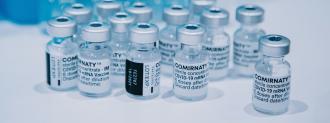On August 23, Pfizer’s shot became the first FDA-approved COVID-19 vaccine, making the move up from an emergency use authorization (EUA).
“Today’s milestone puts us one step closer to altering the course of this pandemic in the U.S.,” acting FDA Commissioner Janet Woodcock said in a statement.
The challenge: The FDA has issued EUAs for three COVID-19 vaccines, and about half the U.S. population is now fully vaccinated. However, about 85 million eligible Americans still haven’t gotten a shot.
Three in 10 unvaccinated adults said they’d be more likely to get a shot if it was fully approved.
With the more infectious Delta variant of the coronavirus driving up case numbers, getting more people vaccinated as soon as possible is a top priority for the U.S.
Vaccine hesitancy: A concern that vaccines issued EUAs are “experimental” has been linked to vaccine hesitancy in the U.S., and a June survey by the Kaiser Family Foundation found that about three in 10 unvaccinated adults said they would be more likely to get a shot if it was fully approved.
Some experts predict the number of unvaccinated people who’ll actually be swayed by the FDA approval will be closer to 5%, but that would still translate to millions of newly protected people.
“[W]e recognize that for some, the FDA approval of a vaccine may now instill additional confidence to get vaccinated,” Woodcock said.
“Mandating becomes much easier when you have full approval.”
Carlos del Rio
Mandated vaccines: Now that the FDA has approved Pfizer’s COVID-19 vaccine, it may be easier for workplaces, schools, and more to require the shots.
“Mandating becomes much easier when you have full approval,” Carlos del Rio, a professor of global health at Emory University, told AP News. “I think a lot of businesses have been waiting for it.”
The path to approval: The FDA approved Pfizer’s COVID-19 vaccine based on factory inspections, safety data, and the results of larger clinical trials with longer follow-up of participants than it considered when issuing the EUA.
These trials found the vaccine to be 91% effective at preventing symptomatic COVID-19 in people 16 and older. The FDA approval only applies to people in that age group, but adolescents between 12 and 15 can still get Pfizer’s shot under the EUA.
“While this and other vaccines have met the FDA’s rigorous, scientific standards for emergency use authorization, as the first FDA-approved COVID-19 vaccine, the public can be very confident that this vaccine meets the high standards for safety, effectiveness, and manufacturing quality the FDA requires of an approved product,” Woodcock said.
We’d love to hear from you! If you have a comment about this article or if you have a tip for a future Freethink story, please email us at [email protected].






